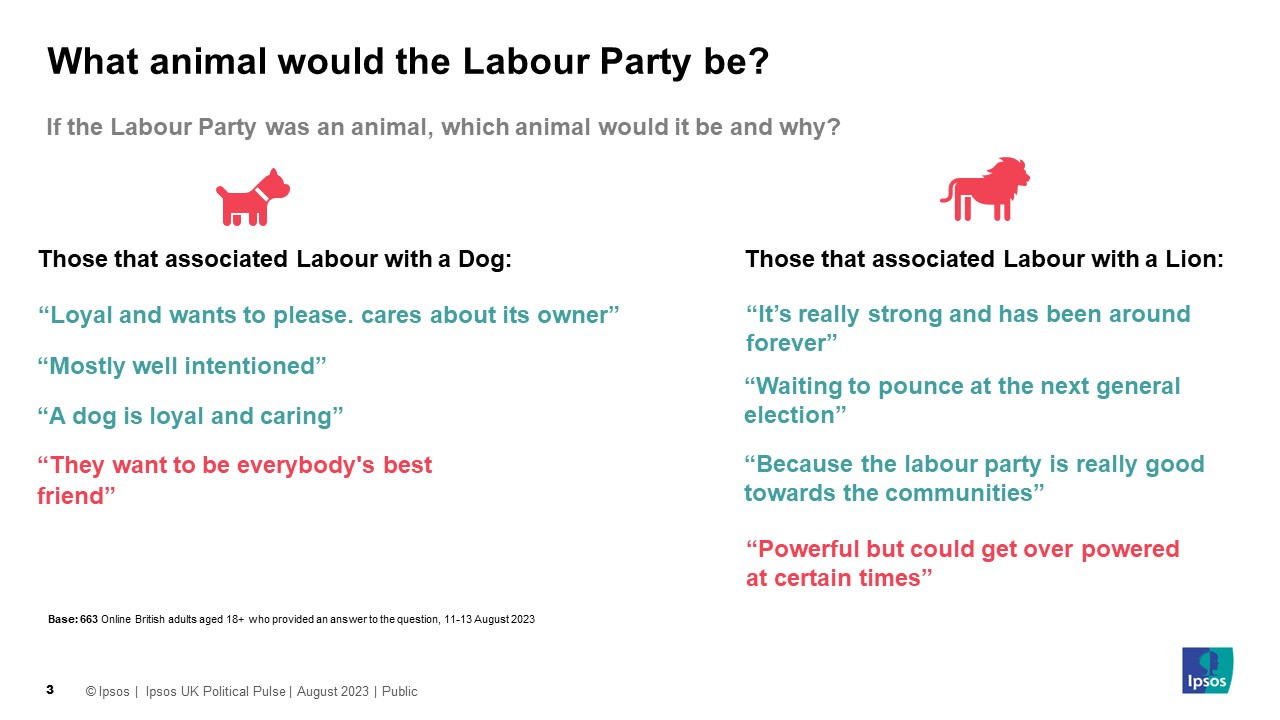Majority of Britons think it is likely Keir Starmer will become Prime Minister
- Labour leader seen as more likely to understand problems facing Britain and be in touch with ordinary people than Prime Minister Rishi Sunak
- But public remain split on whether it is clear what Starmer stands for
The latest Ipsos Political Pulse, conducted online between August 11th – 14th asked favourability towards the parties and various senior politicians, whether things are heading in the right or wrong direction and what impact Brexit is having on the U.K. We also asked whether various leadership attributes applied to Prime Minister Rishi Sunak and Labour leader Keir Starmer, if it was clear what each leader stood for and how likely it was that Keir Starmer would become Prime Minister in the future.
Rishi Sunak and Keir Starmer Leader image
- When we asked whether 12 key leadership traits apply to Rishi Sunak and Keir Starmer, we found that Starmer leads Sunak on 9 of the traits. Starmer continues to lead Sunak by 20 points on being in touch with ordinary people (Starmer 37%, Sunak 17%), by 15 points on understanding the problems facing Britain (Starmer 47%, Sunak 32%), and by 11 points on being an experienced leader (Starmer 37%, Sunak 26%).
- Sunak only leads on two key traits: on being good in a crisis by 5 points, and having a lot of personality by 1 point (in reality a statistical tie).
- 52% of Britons say it is clear what Sunak stands for compared to 46% for Keir Starmer. These ratings are similar to when the public were last asked in April 2023 (Sunak 54%, Starmer 46%).
Furthermore, in terms of their favourability ratings, both Sunak and Starmer’s ratings remain consistent with July. For Prime Minister Rishi Sunak, 27% are favourable (+1 from July) while almost half (49%) are unfavourable (+2). For Starmer 30% have a favourable opinion (-2 from July) compared to 38% who have an unfavourable opinion (-1). This means Starmer leads Sunak on net favourability with a -8 rating, compared to -22 for Sunak.
Will Keir Starmer be Prime Minister?
Elsewhere in the findings, 56% think it is likely that Keir Starmer will be Prime Minister in the future compared to 28% who think it is unlikely. This matches Starmer’s previous highest score on this measure from October 2022. In April, the equivalent numbers were 50% and 34%.
Favourability towards political parties
In terms of the latest monthly Ipsos Political Pulse tracking questions on party favourability ratings, there is little change:
- 23% of Britons are favourable towards the Conservatives (+1 from July), 53% unfavourable (-1pt).
- 38% are favourable towards the Labour Party (+2), 34% unfavourable (-2pt).
- This means the Conservative’s net favourability score is -30 vs +4 for Labour. This is Labour’s highest net favourability since the question was first asked in November 2019.
In terms of the other parties:
- 22% have a favourable opinion towards the Liberal Democrats (-1 from July), 35% unfavourable (+1 from July). Net favourability: -13
- 27% have a favourable opinion towards the Green Party (-1 from July), 32% unfavourable (+5). Net favourability score: -5
- 13% have a favourable opinion towards Reform UK (-1 from July), 44% unfavourable (+3 from July). Net favourability: -31
Direction of the country/ impact of Brexit
-
63% of Britons think things are heading in the wrong direction overall (N/C from July) and 18% think things are heading in the right direction (+5). This gives a net right direction of -45.
-
55% think Brexit has had a negative impact on the country (-2 from July) and 21% say positive (+1).
Ipsos Director of Politics Keiran Pedley said of the findings:
As it stands, the British public expect Keir Starmer to be Prime Minister. A majority are unfavourable towards the Conservative Party and Starmer leads Rishi Sunak on several key leadership traits. However, with many still unsure what Starmer himself stands for, the Labour leader will hope he can set out a compelling vision for the country in the coming months to seal the deal with the electorate.
What animals would the Conservative Party and Labour Party be?
Labour most associated with dogs and lions, Conservatives with snakes and lions
We asked the public what animals the Conservative Party and the Labour Party would be and why. Whilst 43% couldn’t give an answer for Labour and 38% couldn’t give an answer for the Conservatives, the answers that were given provides unique insight into how the two parties are viewed by the public.

The top two mentions for the Labour Party were dogs and lions.

The top two mentions for the Conservatives were snakes and lions.
Ipsos Director of Politics Keiran Pedley said of the findings:
Whilst in some ways this sort of polling is a bit of fun, it does uncover how the public view the two parties on a more subconscious and instinctive level. The public associate Labour with positive traits attributed to dogs such as loyalty and caring about people but sometimes wonder if they are focused or strong enough to lead. Meanwhile, on the Conservative side, the public are split between those that associate the party with the untrustworthy ‘slippery’ snake – a very damaging image for a political party to hold – and those that see the strength and leadership traits of a lion.
Technical note
Ipsos UK interviewed a representative sample of 1,088 GB adults aged 18+. Interviews were conducted online from 11-14 August 2023. Data are weighted to match the profile of the population. All polls are subject to a wide range of potential sources of error.






